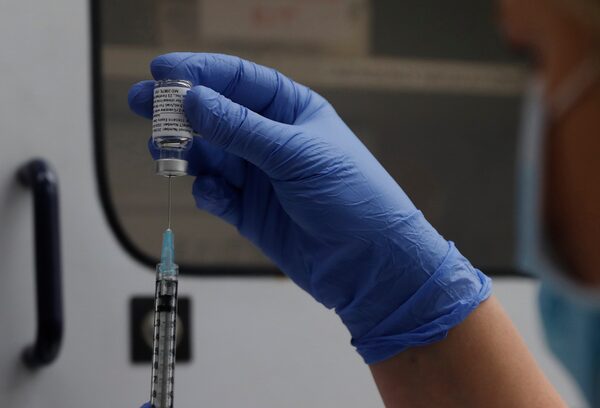
A vial of the Phase 3 Novavax coronavirus vaccine is seen ready for use in the trial at St. George's University hospital in London on Oct. 7, 2020.Alastair Grant/The Associated Press
In the rush to develop more COVID-19 vaccines, drug makers are confronting a perplexing challenge: how to find enough senior volunteers for vaccine trials.
Recruiting participants over 65 to test vaccines has become increasingly difficult as governments around the world roll out inoculation programs that start with older people. That has put drug makers in an ethical bind since half of the participants in trials are given placebos, leaving them vulnerable to catching the disease. The lower number of older volunteers has also raised questions about whether enough data has been gathered to establish the efficacy of some vaccines for seniors.
Securing enough older volunteers “has been a major challenge,” said Paul Heath, director of the Vaccine Institute at the University of London, who led British trials for U.S.-based drug company Novavax. “It does mean that as the trial goes on, more and more participants are being lost. This is clearly not ideal from a trial point of view but we all knew this was going to happen.”
Getting the jab done: When can Canadians expect to get a COVID-19 vaccine?
In a press briefing last Friday, Dr. Heath said up to 10 per cent of volunteers in the Novavax trials had dropped out because they’d become eligible for vaccinations. The company’s policy is that as soon as volunteers are eligible for a shot they are “unblinded” and anyone who received the placebo is encouraged to get vaccinated.
Interim results from Novavax’s British trials, which were the company’s largest and involved 15,000 volunteers, showed that the vaccine was 89-per-cent effective. However, Novavax said it didn’t have enough data to determine how effective it was in protecting people over 65. The company expects to have final data in a few weeks.
“Clearly we hope that it will be as effective and as safe in [the over 65] group and have every reason to believe that will be the case. But the truth is we need to wait for those data to come out,” Dr. Heath said.
The interim results “mean for the elderly and the question about efficacy, we are in a sense relying on the data that will have been gathered earlier in the trial.”
AstraZeneca has also run into ethical issues during trials for its COVID-19 vaccine, which was developed in conjunction with the University of Oxford. Oxford researchers ran most of the trials last summer, before vaccines were authorized in any country, and they refused to include participants over 60 until they were certain the vaccine was safe in younger age groups. As a result, by the time the vaccine came to regulators for approval, there wasn’t enough data on older volunteers to establish efficacy.
“The issue with the elderly data is not so much whether it works or not. It’s that we have today a limited amount of data in the older population,” AstraZeneca chief executive officer Pascal Soriot said recently. “Other companies took this risk, went ahead and vaccinated older people faster or earlier. If you start earlier, you have more data.”
But Mr. Soriot insisted that “we have strong data showing very strong antibody production against the virus in the elderly, similar to what we see in younger people.”
The lack of data prompted the German government’s vaccine advisory committee to recommend that the Oxford-AstraZeneca jab should only be offered to people between 18 and 64. The committee said there was “currently insufficient data available to assess the vaccine efficacy from 65 years of age.”
French President Emmanuel Macron weighed into the debate last week and suggested that the Oxford-AstraZeneca vaccine was “quasi-ineffective on people older than 65, some say those 60 years or older.”
Regulators in Britain have taken a different approach. Britain was the first country to authorize the Oxford-AstraZeneca vaccine in December and the country’s Medicines and Healthcare products Regulatory Agency concluded that while there was limited information about efficacy on over 65s, there was “nothing to suggest lack of protection.” As a result the MHRA approved the vaccine for everyone over 18.
Last Friday, the European Medicines Agency, which regulates drugs for the European Union, also approved the Oxford-AstraZeneca vaccine for all adults. The EMA said “protection [for over 65s] is expected, given that an immune response is seen in this age group and based on experience with other vaccines.”
Stephen Evans, a professor of pharmacoepidemiology at the London School of Hygiene and Tropical Medicine, said there was no reason to doubt the efficacy of the Oxford-AstraZeneca vaccine. He noted that research published in The Lancet medical journal found that antibody responses in older people was similar to younger people, indicating that efficacy should be similar. “There is no reason at all for anyone in the U.K. or elsewhere to think that this Oxford-AstraZeneca vaccine is ineffective at any age,” he said.
However, Simon Clarke, an associate professor in cellular microbiology at the University of Reading in England, cautioned that stimulating an antibody response didn’t guarantee protection against infection or disease.
“There will now be millions of older and more vulnerable people in the U.K. who have had the [Oxford-AstraZeneca] jab, wondering, am I really protected?” he said. “We know that the [Oxford-AstraZeneca] jab provides some protection, but because the trials recruited only a few hundred over 65s, the data are not clear enough to say for sure exactly how effective it is.”
Health Canada is still assessing the Oxford-AstraZeneca vaccine. The two vaccines in use in Canada, from Pfizer-BioNTech and Moderna, have reported 94-per-cent and 86-per-cent efficacy, respectively, for people over 65.
Sign up for the Coronavirus Update newsletter to read the day’s essential coronavirus news, features and explainers written by Globe reporters and editors.
 Paul Waldie
Paul Waldie